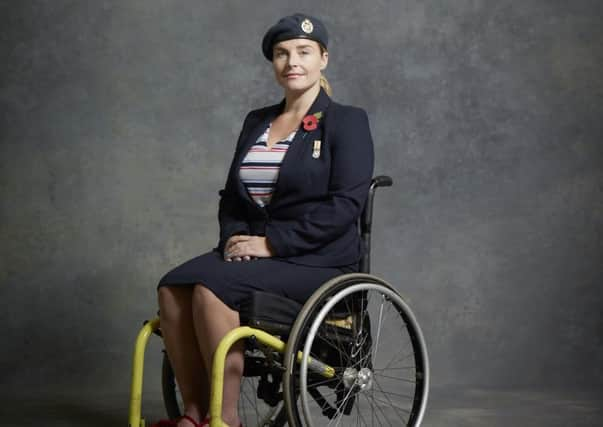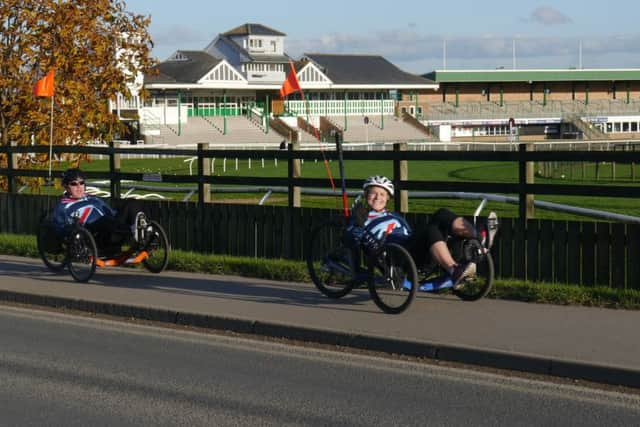How I became the face of this year's Royal British Legion Poppy Appeal


Wearing her navy blue beret and with a medal of honour pinned on her blazer, Anna Pollock looks every inch a proud RAF veteran. However, a few years ago it was a very different story. In 2013, Anna suffered a blood clot and when doctors told the mother of three she would never walk again, it left her facing a very different kind of life.
“I’d always been bold, been a fighter, and the bleed took that away from me,” says the 34 year old, who is starring in a new advertising campaign for the Royal British Legion. “I lost the person that I was. Suddenly I became a shadow of my former self. I’d go out with friends and feel like everyone was looking at me in my wheelchair. I used to be the life and soul of the party; telling jokes, first up to dance, but I felt like I just wanted to go home. I didn’t want any one to see me.
Advertisement
Hide AdAdvertisement
Hide Ad“I was constantly mourning the person that I used to be. I couldn’t get to grips with being happy when I couldn’t do the things I used to be able to do. I was letting my pain, my situation get the better of me.”


Originally from Middlesbrough, Anna, who now lives in Catterick in North Yorkshire, had always led an active life and at 17 had joined the RAF where she met her husband, Bob, an Army physical training officer. When Anna became pregnant with her first child in 2005, just after she had been promoted to Corporal, she decided to put her RAF career on hold.
“It wasn’t about me anymore; it was about this little baby. I knew for a fact that I wouldn’t be able to give my career 100 per cent. It was a big change as I’d always been a risk taker, a bit of a daredevil, but I wanted to be a mother first.”
By 2013, Anna had three children and the family were getting ready to move to Gibraltar where her husband had been transferred. However, the night before they were due to leave, Ann woke up with severe back pain. An hour later she was paralysed from the waist down.
Advertisement
Hide AdAdvertisement
Hide Ad“I was diagnosed with a bleed on my spine. The hospital didn’t have the right equipment to operate, so I had to be transferred. Three hospitals later I did undergo surgery, but by then it was too late and I was told I would never walk again.”


As the months passed, Anna tried to get back on her feet, but even using a crutch she was unable to walk outside and suffered from chronic pain and fatigue. The turning point came a year later when Anna went to a meeting for wounded, injured and sick veterans and was encouraged to go out on a recumbent bike where the rider is seated in a reclining position.
“I remember going down a hill at 25mph with the wind in my hair and thinking, ‘this is immense’,” she says. “When you jump out of an airplane, it makes you feel completely alive. Riding the bike made me want to keep that feeling, especially for my children. They were becoming my carers and I didn’t want that for them.”
With funding from the Royal British Legion, Anna bought her own bike and started taking on long distance challenges, eventually setting her sights on the Arch to Arc triathlon. The event sees competitors run from London’s Marble Arch to the coast, swim The Channel, then cycle to the Arc de Triomphe. Many drop out en route, but Anna became one of the few to make it over the finishing line.
Advertisement
Hide AdAdvertisement
Hide Ad“I realised I didn’t have to give into the pain,” she says. “Even though I’d never be the person that I used to be, I realised that the person I was going to be was ok too. The year I took on the Arch to Arc was an unbelievable 12 months. But at the end of it I had an operation which didn’t’ go very well.
“I had to have another operation, then I became ill and I ended up coming down with septicaemia.”
While still recovering from her latest setback, Anna received a call from her contact at the Legion who was wondering whether she had ever considered trying out for the Invictus Games. Launched by Prince Harry to give wounded, injured or sick armed services personnel a platform to excel, the very first event had taken place in 2014 and the GB was looking for new recruits to take to Florida in 2016.
“I didn’t think I had a hope in hell,” says Anna. “Two days before the trials I had taken the last antibiotics and I still felt unwell. But Donna said, ‘You’ve got nothing to lose, just go for it’.”
Advertisement
Hide AdAdvertisement
Hide AdDespite being some way from peak fitness, Anna passed the trials and ended up competing in various swimming events at this year’s Invictus Games, taking bronze medals in 10m and 100m freestyle as well as the 50m breaststroke.
“The Legion did so much to get the families there, and that made such a big difference from everyone,” says Anna. “I know for a fact that my kids will be better people for seeing how others have overcome their own challenges.”
The charity’s new advertising campaign also hopes to increase awareness about younger veterans. Played on seven monoliths in London’s Paternoster Square, he four 60-second films, which can also be viewed online, are narrated by a Second World War veteran aged between 88 and 97. At the end it is revealed that the stories do not belong to the speaker, but to a younger veteran or member of the Armed Forces aged between 29 and 34.
“Watching a Second World War veteran tell your story is really emotional and I think it is a powerful message. No one knew why the blood clot happened to me. I didn’t have an accident; it was just a freak event in the night. I was young and fit and health. When I look back at the amazing things that I have done since, it makes what happened easier to bear.
Advertisement
Hide AdAdvertisement
Hide Ad“This is especially true on my darker days, when I don’t get out of bed and the pain is just too much. I can think that I can do it, I just have to try tomorrow, because look what I’ve done, what I’ve achieved.
“It gives me a lot of self-worth as well. It means you’re not defined by your illness or injury. You’re defined by your ability to overcome and your ability to not let it be the end of you.
“Invictus pushed me to be more in control of my physical health day to day, so that I can be there for my kids. Now I’m increasingly in the driving seat as the head of family life. It’s not anywhere near as much I’d like to be but it’s better than it was. So that’s been a massive step forward for me this year.
“You can’t give up until you’ve tried. I won’t know whether I’ll be able to cope with all this until it all comes to fruition, but my main priority will always be being a mam and a wife first. That’s what’ll be my driving force, whatever’s best for them.
Advertisement
Hide AdAdvertisement
Hide Ad“At first my husband wouldn’t leave me alone with the children, but now I’m the one who’s in charge of the kids.
“I’ll always have chronic pain and chronic fatigue. It’s always there in the background, but the days you beat it: those are the victory days. “Not every day can be a victory, which makes them all the sweeter.
“It has been an incredible few years with so many highs and lows, but for now I just want to get back to being a full-time mum.”